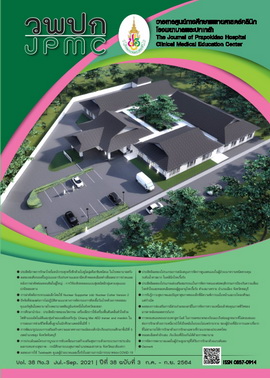The Development of an Instruction Model for Emotional Intelligence of The Fifth - year Elementary Students in Khlung District, Chanthaburi
Main Article Content
Abstract
BACKGROUND: Emotional intelligence could be developed as it is not the result of genetics. In consequence, elementary students should be instructed to enhance their emotional intelligence which influences their learning and living.
OBJECTIVES: To develop the instruction pattern of emotional intelligence development and to study fifth - year elementary students instructional pattern of emotional intelligence in Khlung District, Chanthaburi.
METHODS: The samples of this research and development included twelve persons who were experts, medical doctors, nurses, teachers, and student guardians. The samples for the experiment were 80 students in the fifth - year of elementary education, selected by purposive sampling. The research tool could be divided into the tools for the experiment, which were the development of instruction patterns of emotional intelligence. The authors created 14 instruction patterns over 14 weeks. The tools for data collection comprised an emotional intelligence evaluation of children aged 6 - 11 (for student guardians). The statistical significance were an independent t - test and paired t - test.
RESULTS: The emotional intelligence of the fifth - year elementary students, regarding EQ factors that were being good, smart, and happy, the result before and after the experiment showed the difference with statistical significance (p < 0.001) and the emotional intelligence of the fifth-year elementary students regarding the EQ factors were being good, smart, and happy, after the experiment for the experimental group and the control group, the result showed a statistical significant difference (p < 0.001).
CONCLUSIONS: This research could be the guideline for the related unit to deal with the enhancement of elementary children’s emotional intelligence and to adjust the instruction model for the emotional intelligence of elementary students appropriately.
Article Details
References
Yuyen R. The effect of story-telling with role-play on the second year preschoolers’ self-confidence. Veridian E-Journal 2014;7(2) :779–87.
Wongpratum N., Wongsaward K, Krangprapan M. Manual for sex education learning management based on teaching life skill ideas and Yonisomanasikan to enhance analytical thinking, social responsibility, and learning achievement of the learning substance group of health education and physical education of Pratom suksa 6 students. Journal of Graduate School Sakon Nakhon Rajabhat University2016;13(61): 39-49.
Teimtad S. Family structure and cognitive skill among Thai students. Development Economic Review 2016 ;10(1) : 61-83.
Chandee P, Pitayanon T. Strategies for activities development of primary school learners in promoting good citizenship according to the security idealogy and security policy promote good citizenship within Southern-Border Provinces of Thailand. EAU Heritage Journal Social Science and Humanities 2016; 6(1): 161-76.
Piriyakoontorn S, Balthip K, Petchruschatachart U., Tiraphat N. Developing a model for enhancing the goodness , smartness and happiness of Thai primary school students in Songkhla province: a participation action research study. Songklanagarind Journal of Nursing 2016;36(3) :150-71.
Public Health Ministry. 6-11 years emotional quotient assessment questionaries for patients [Internet]. Nonthaburi: Department of Mental Health; 2020 [cited 2021 May 13]. Available form: https://dmh-elibrary.org/items/show/41
Biarpat N. Chanruchai S, Mutukan W. Developing the counseling activity applied with carl rogers theory and simulation approach, to enhance emotional intelligence and self-esteem of Prathomsuksa 4 students. Buabandit Journal of Educational Adminisitration (BUAJEAD) 2015; 15(special issue):87-95.
Mongkang A. Effect of group activity on emotional quotient of Mattayom Suksa 6 students at Chonkanyanukoon School, Chonburi Province : a preliminary study. TNSU Journal 2012; 16(32) : 53 – 72.

